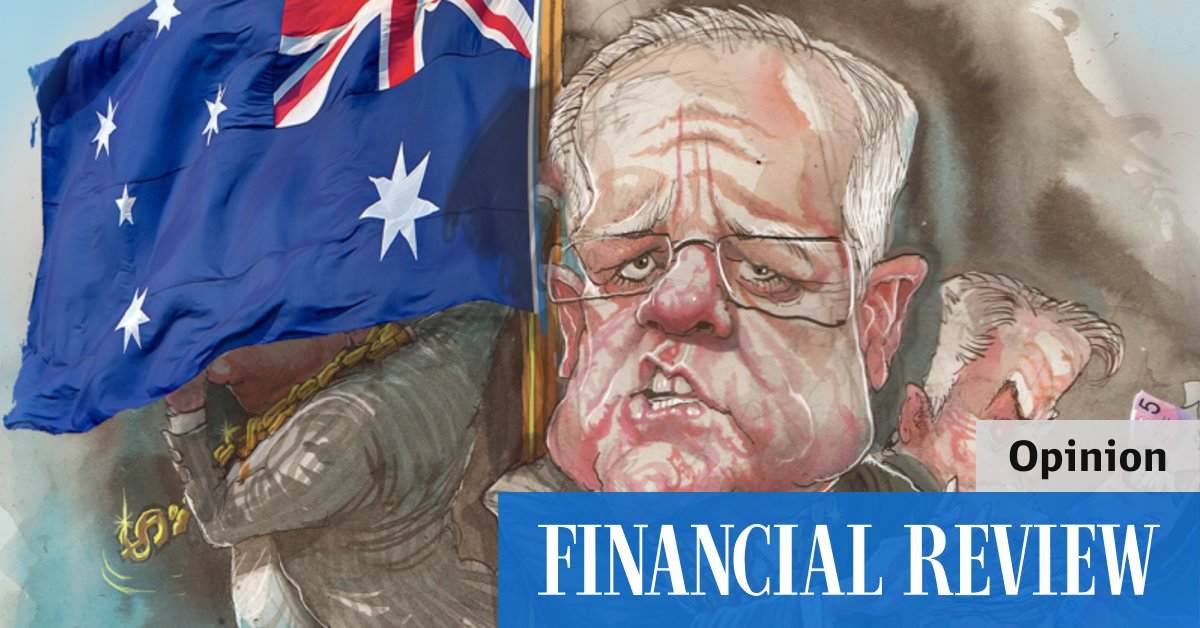Why Scott Morrison rejects the ‘stakeholder’ economy

The World Economic Forum set the hares running in May when it launched the concept of “the great reset”.
Essentially, it advocates a shift from shareholder capitalism to stakeholder capitalism which requires business outcomes to focus on the needs of all stakeholders: customers, employees, partners, the community, and society as a whole. Not just shareholders.
To be caught up now in a global debate over stakeholder capitalism is mildly reminiscent of the banking debate during the GFC.
WEF founder and executive chairman Klaus Schwab said there were many reasons to pursue the concept, “but the most urgent is COVID-19″ because it had exacerbated the already endemic crises of capitalism such as inequality and environmental destruction.
Schwab wrote that the collective willingness to make sacrifices and change work patterns during the crisis showed that “clearly, the will to build a better society does exist”.
“That will require stronger and more effective governments, though this does not imply an ideological push for bigger ones. And it will demand private-sector engagement every step of the way,” he added.
The great reset agenda would include the creation of a “stakeholder economy”.
“At a time of diminishing tax bases and soaring public debt, governments have a powerful incentive to pursue such action,” said Schwab.
“Moreover, governments should implement long overdue reforms that promote more equitable outcomes. Depending on the country, these may include changes to wealth taxes, the withdrawal of fossil-fuel subsidies, and new rules governing intellectual property, trade, and competition.”
Growing inequality
In the United States, where the callous indifference of Donald Trump, combined with a lack of public healthcare and welfare safety net, have exacerbated gross inequality, Joe Biden is vowing to “build back better”.
Boris Johnson says the crisis underscores the need for his “levelling-up” agenda.
In Australia thus far, the great reset has gained little traction in mainstream politics.
At the edges, Labor has been arguing for some time now that the economy cannot go back to its old ways. Instead, the restoration must be used to fix the flaws the crash has exposed. These include job insecurity though the over-reliance on casual workers and labour hire, and inequality in general, such as a boosted unemployment benefit.
But nothing radical.
The far right, however is all over it and, shrill as ever, has been for some time.
“It’s about globalisation, they’re pushing their own agenda, and I think it’s pushing us toward the socialist left Marxist view of the world,” Pauline Hanson told Sky News After Dark early last month.
“It’s about getting rid of capitalism, and so if you’ve got a company you shouldn’t have shareholders, you should be sharing the wealth around – that is total socialism.”
It is understandable that strong support for the great reset would exist in countries such as Britain and the US, where appalling public health and welfare systems have not only inhibited their abilities to fight the virus, but long ago entrenched inequality far worse than what exists in Australia.
‘Not a failure of capitalism’
Nonetheless, and cognisant of growing voices on the right, Morrison has started to make a case against the global reset in anticipation of a push for a more socialist approach to economic policy next year and beyond.
His November 23 speech to the UK’s Policy Exchange think tank was focused on China. But there were a few sharp lines aimed at the global reset as well.
The pandemic recession, he said, was not “the product of the failure of world capitalism or liberal free-market-based values”.
“It is actually these values that have provided the platform for the greatest period of peace and prosperity the world has ever known, and has underpinned the very global institutions that have helped sustain it,” he said.
“It is these values that must now drive our economic recovery out of the pandemic recession.
“These same values are also the best way for us to pursue greater economic inclusion and poverty alleviation as a result, the empowerment of women, environmental sustainability, climate resilience, as well as continuing to combat transnational crime and extremism, terrorism in all its forms.
“We don’t need to ‘reset’ our economic agenda, we just need to get on with it.“
He expressed a similar view on breakfast television last week when he said the pandemic was caused by a virus that hit like a meteor and forced the closure of business. A liberal market-based democracy with a health and welfare safety net remained the best model of government.
It’s a message Morrison will take to the G7 and other global forums next year.
To be caught up now in a global debate over stakeholder capitalism – which Australia’s universal health and welfare system already facilitates, in comparison with others – is mildly reminiscent of the banking debate during the global financial crisis.
World leaders, including Kevin Rudd, argued at the G20 in 2009 about the need for global banking reforms after the cowboy antics of US banks sent the world into a nosedive. But thanks to the regulatory regime introduced by Peter Costello, Australia’s banks were already well ahead and the G20 debate was largely irrelevant.
However, inequalities still exist and everything is relative. Resentment towards wealth, real or imagined, is on the rise in Australia.
Nor will the federal government be the only one to feel the pressures.
The states are horribly mired in record debt and deficit, and their avenues for combating their plight are smaller.
How soon will it be before an entrenched Labor state or territory government, such as that in the ACT or Victoria, desperate for cash, will adopt Schwab’s idea of a wealth tax – that is, death tax – cloaked in the guise of equity?
*** This article has been archived for your research. The original version from The Australian Financial Review can be found here ***

